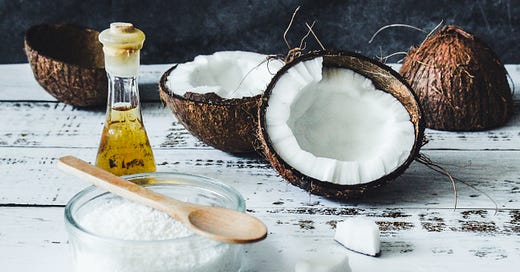Unlocking the Secrets of Coconut Oil and MCT Oil: Your Comprehensive Guide to Quality, Value, and Health Benefits
MEDICAL TRUTH NEWS: Discover the Best Coconut Oil and MCT Oil Products – Making Informed Choices for Well
Coconut oil and Medium Chain Triglycerides (MCT) oil have been making waves in the health and wellness community for their potential benefits. But with a plethora of products on the market, how do you know which one is right for you? In this review, we'll delve into the world of coconut oil and MCT oil, exploring what they are, how they are used, and what ConsumerLab's tests have found about these oils. Whether you're a cooking enthusiast or seeking potential health benefits, read on to find the best coconut oil and MCT oil for your needs.
What is Coconut Oil and MCT Oil?
Coconut oil is derived from the meat of coconuts and is composed of various fatty acids, with Medium Chain Triglycerides (MCTs) being the star of the show. MCTs are made up of caprylic, capric, and predominantly lauric acids. Interestingly, virgin coconut oil, often referred to as "cold-pressed" coconut oil, contains more than 50% MCTs but also has long-chain triglycerides that give it a semi-solid consistency at room temperature. On the other hand, refined coconut oil undergoes further processing to remove the long-chain triglycerides, resulting in a liquid oil composed mainly of caprylic and capric acids, making it about 85% MCTs. For those seeking even higher MCT concentrations, there's pure MCT oil, boasting 95% or more of caprylic and/or capric acids. Additionally, these oils can be combined with fibrous ingredients to create powdered oil supplements.
How are Coconut Oil and MCT Oil Used?
Coconut oil and MCT oil offer versatility in their usage. Virgin coconut oil and refined coconut oil can be incorporated into various culinary delights or used topically for skin and hair care. Meanwhile, refined coconut oil and MCT oil products have gained popularity as dietary supplements, as they are primarily used for energy rather than fat storage. While ongoing research suggests potential benefits in treating conditions like Alzheimer's disease, epilepsy, and fat malabsorption, it's important to note that conclusive evidence is still lacking.
What Did CL's Tests Find About Coconut Oil and MCT Oil?
ConsumerLab conducted extensive tests on various coconut oil and MCT oil products. The good news is that all the products passed their rigorous assessments. However, what's truly fascinating is the vast difference in value among these products. When it comes to obtaining 8 grams of MCTs, the cost ranged from a mere 7 cents to a whopping $1.68. This means that you could potentially pay over 20 times more for the same amount of MCTs depending on the product you choose. So, making an informed choice becomes crucial.
ConsumerLab didn't stop at testing; they also selected Top Picks for virgin coconut oils, refined coconut oils, and MCT oils based on a combination of quality and cost. Look for their seal of approval when shopping for these oils to ensure you're getting the best bang for your buck.
Best Coconut Oil and MCT Oil: What to Look For
When it comes to selecting the best coconut oil, a few key factors should guide your choice. First, don't be swayed by the term "extra virgin" when looking at virgin coconut oils; it may not be worth paying extra for this designation. Instead, focus on finding a liquid product if you're aiming for higher MCT concentrations, as this signifies that the oil has been refined. Check for the "Total MCTs" amount on the product label, which should constitute at least 85% of the serving of oil. For those seeking primarily caprylic and/or capric acids—the shorter MCTs—ensure that these components make up 95% or more of the oil.
How Much Coconut Oil Should I Take and When?
The serving size for coconut oil can vary depending on its intended use. Some recommendations range from a teaspoon to several tablespoons daily. To determine the right dosage for your specific needs, refer to the What It Does section, which provides detailed information on dosage for various purposes.
Side Effects of Coconut and MCT Oil
While coconut and MCT oils offer potential benefits, it's important to be aware of potential side effects. MCTs are saturated fats, and most of the fat in coconut oil is saturated fat. While some research suggests that MCTs are less likely to be stored as fat compared to longer-chain fatty acids, they may lead to an increase in "bad" cholesterol levels. For a more in-depth exploration of potential concerns and cautions, consult the Concerns and Cautions section.
In conclusion, coconut oil and MCT oil are intriguing products with a range of potential benefits. However, it's essential to make an informed decision when choosing these oils, considering factors such as MCT concentration, quality, and cost. ConsumerLab's tests and recommendations can serve as valuable tools to help you find the best coconut oil and MCT oil for your unique needs and preferences. Whether you're using them in your culinary creations or as part of your daily supplement regimen, these oils may just be the health boost you've been searching for.





